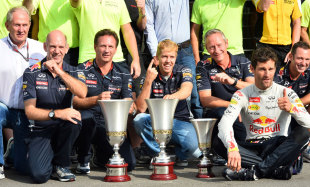
- Race:
- Italian Grand Prix
Arriving at the Autodromo Nazionale di Monza as a journalist you have to fight your way past a collection of Tifosi - increasing by the day as the weekend progresses - to head towards the paddock gates.
As you would expect, Ferrari red dominates the scene. The Parco di Monza becomes a hive of passion for the sport and the vast majority of both fans and journalists turned up on Sunday morning hoping for a race result which would breathe new life in to the championship battle.
Ultimately, rain was the missing ingredient as Sebastian Vettel converted pole position in to a comfortable victory and the best Fernando Alonso could give the Italian fans was a distant second place.
Writing a race report with seven grands prix still to go, the last thing you want to be doing is saying a driver has one hand on the title already, but Red Bull's dominance over the last two races is a big blow to the chasing pack, and one that shouldn't be underestimated.
Ferrari president Luca di Montezemolo was present in the paddock on Saturday, and although he didn't give an organised press briefing this year, one topic he usually likes to touch upon is the dependence on aerodynamics in Formula One today. An area where Red Bull is so strong, Montezemolo has previously been keen to stress that aero is not as important when it comes to making road cars and therefore the sport is in danger of becoming irrelevant for Ferrari.
But aero remains king, and in past years Adrian Newey has actually been hamstrung by his own genius in designing a car with so much downforce. Monza (and to a lesser extent Spa) is all about reducing drag - the term 'low downforce circuit' means you want less of it at those tracks - and Red Bull has had more downforce than its competitors in recent years.
It's been a mightily impressive job by the reigning champions to ensure it also had the quickest car at both of the last two tracks, but for the casual viewer it's threatened to sap the life from this year's championship. The parallels with Ferrari's dominance in the early 2000s are clear; however there is hope on the horizon in the shape of 2014.
One area where Formula One manages to help itself is in the form of changing regulations - sometimes on a bigger scale than others - which can affect the competitive order from the previous year. All of the hype around the second Red Bull seat this year has been because it's been consistently the strongest car in since the second half of 2009, and regulations have remained relatively stable in that time.
And while it would be very foolish to underestimate Newey's prowess, there are no guarantees that Red Bull will have the strongest car next year. Like Ferrari, McLaren and now Mercedes, the team has the infrastructure in place to ensure it is on the pace eventually, but this year's order has a much smaller impact on hopes for 2014.
Early whispers suggest that Mercedes will have the strongest engine - also benefitting McLaren, Force India and Williams - and Lotus is keen to ensure it has a better partnership with Renault next year than it currently enjoys.
The nature of such a regulation change does open up the possibility for one team to find a golden bullet in the same way that Brawn did at the start of 2009, but so many new technologies in terms of power units and energy recovery systems is likely to see more reliability issues during races and fluctuations in form at each round.
Credit where credit's due; Red Bull has done an incredible job to put itself in such a strong position this year. If it does go on to wrap up both titles with time to spare it won't have long to enjoy it, because in six months' time the picture could all look very different.
Chris Medland is assistant editor at ESPNF1
© ESPN Sports Media Ltd.
 Chris Medland is assistant editor at ESPNF1 Chris Medland, who in his youth even found the Pacific GPs entertaining, talked his way in to work at the British Grand Prix and was somehow retained for three years. He also worked on the BBC's F1 output prior to becoming assistant editor ahead of the 2011 season
Chris Medland is assistant editor at ESPNF1 Chris Medland, who in his youth even found the Pacific GPs entertaining, talked his way in to work at the British Grand Prix and was somehow retained for three years. He also worked on the BBC's F1 output prior to becoming assistant editor ahead of the 2011 season

